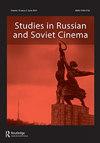Eisenstein in Fergana: from avant-garde to national form
IF 0.4
0 FILM, RADIO, TELEVISION
引用次数: 1
Abstract
ABSTRACT Sergei Eisenstein’s work on The Great Fergana Canal in 1939 and his subsequent wartime evacuation to Kazakhstan gave him the opportunity to reflect on Stalin’s famous definition of proletarian culture as ‘national in form, socialist in content’. The modernist cult of difficult forms endured a radical reformulation through the 1930s. The insistence on clarity and accessibility, fuelled by the emergence of the Socialist Realist style, made aesthetic intricacy unacceptable and dramatically reshaped acceptable practices of perception and expression. But the ‘strangeness’ of the Orient allowed the modernist valorisation of defamiliarized forms to continue its existence in new ways. The ‘national in form, socialist in content’ formula provided a context in which formal strangeness could re-emerge as a sanctioned entity. Formal experimentation was possible only in the national context, and only if singular socialist content predominated. As such, national form was the last sanctuary of modernist strangeness. By utilising this formula, the late modernist Eisenstein concerned himself with creating national building blocks for the socialist edifice, which was, in turn, intended to evolve into a supranational construct.费尔干纳的爱森斯坦:从先锋到民族
谢尔盖·爱森斯坦(Sergei Eisenstein) 1939年在费尔干纳大运河(Great Fergana Canal)上的工作,以及他随后在战争期间撤往哈萨克斯坦的经历,让他有机会反思斯大林对无产阶级文化的著名定义——“形式上是民族的,内容上是社会主义的”。20世纪30年代,现代主义对复杂形式的崇拜经历了一次彻底的重塑。在社会主义现实主义风格的推动下,对清晰和可接近性的坚持,使审美复杂性变得不可接受,并戏剧性地重塑了可接受的感知和表达实践。但是,东方的“陌生感”使现代主义的不熟悉形式得以以新的方式继续存在。“形式是民族的,内容是社会主义的”公式提供了一种背景,在这种背景下,正式的陌生感可以作为一种被认可的实体重新出现。只有在国家背景下,只有在单一的社会主义内容占主导地位的情况下,正式的实验才有可能。因此,民族形式是现代主义陌生感的最后庇护所。通过利用这一公式,已故现代主义者爱森斯坦关注于为社会主义大厦创造国家基石,而社会主义大厦反过来又打算演变成一个超国家的建筑。
本文章由计算机程序翻译,如有差异,请以英文原文为准。
求助全文
约1分钟内获得全文
求助全文

 求助内容:
求助内容: 应助结果提醒方式:
应助结果提醒方式:


